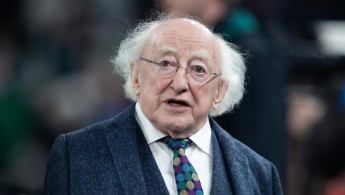Ireland president clashes with Israel embassy over letter to Iran's Pezeshkian
Ireland's president has clashed with the Israeli embassy after he gave his "best wishes" to his new Iranian counterpart, Masoud Pezeshkian, and sparked a reaction from Israel.
Irish president Michael D Higgins said on Sunday that his letter to Pezeshkian, voted in as Iranian president following the May death of his predecessor Ebrahim Raisi, was "standard" to a "newly elected head of state" and that it stressed regional peace.
Higgins, who faced criticism in August over his message to Pezeshkian, was questioned about the letter by The Irish Independent.
"Why don't you ask where it came from? … Where the criticism came from and how the letter was circulated and by whom and for what purpose?" he said, according to the PA news agency.
"It was circulated from the Israeli embassy."
The Israeli embassy in Dublin responded that in Ireland, since the 7 October Hamas-led attack on Israel, Israel has been "subjected to a high level of malicious statements and accusations that have often manifested as incitement to hatred".
"This baseless accusation is highly inflammatory and potentially slanderous and the embassy rejects it completely," the embassy said.
"The fact remains that the letter was written and therefore it is the burden of the author to defend its content," the embassy added, claiming that Iran "calls for Israel's destruction" and "arms and funds" groups including Hamas and Hezbollah.
'Official message'
On 26 July, the Iranian embassy in Ireland published a news update on its website saying Higgins had congratulated Pezeshkian on his election win in an "official message".
It added that he gave his condolences for the deaths of former Iranian president Ebrahim Raisi, foreign minister Hossein Amir-Abdollahian, and those with them in a deadly helicopter crash in May.
"President Higgins expressed hope for the expansion of bilateral relations between the two countries and noted that the reopening of the Irish embassy in Tehran would facilitate closer cooperation," the Iranian embassy's news update read.
"He concluded with his very best wishes for Dr Pezeshkian endeavours amongst the challenges we all face at this difficult time as we struggle for peace."
A since-removed Iranian embassy post on X included a link to the news update.
"The exchange of letters upon the coming to office of a new head of state is standard diplomatic practice for countries which share diplomatic relations," a spokesperson for Higgins' office was quoted as saying by the BBC.
The spokesperson said that in reply to questions, the Irish president had expressed his position that a "standard diplomatic letter had been circulated over the summer and presented as being something out of the ordinary".
"The president made no accusations of a leak, he solely referred to the letter being circulated. In this context, the question of reporting does not arise," the spokesperson said.
'Catastrophe unfolding in the Middle East'
Irish Prime Minister Simon Harris supported Higgins.
He said he believed the Israeli embassy "should be focusing on things other than amplifying, circulating or referencing a letter that does really conform with normal diplomatic protocol between heads of state".
"Certainly, my focus here in New York is not on an exchange of letters, but is on the fact that there is still a horrific, bloody humanitarian catastrophe unfolding in the Middle East," Harris said.
"I have no interest whatsoever in getting into any sort of tit-for-tat or back-or-forth with the Israeli embassy or the government of a country that is continuing to allow this horrific humanitarian situation continue."
Israel's war on Gaza has killed more than 41,000 people, according to the Palestinian enclave's health ministry.
Hospitals, places of worship, and residential buildings have been attacked, while South Africa has dragged Israel before the International Court of Justice, the UN's top tribunal, on allegations of genocide.





 Follow the Middle East's top stories in English at The New Arab on Google News
Follow the Middle East's top stories in English at The New Arab on Google News

![MP Essam Diab's pursuit to block TikTok in Egypt has revived an already ongoing debate in the country. [Getty]](/sites/default/files/styles/image_330x185/public/1230748046.jpeg?h=a5f2f23a&itok=-8MqBLLC)
